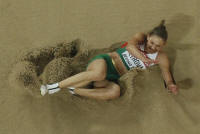|
 Petrova
denies wrongdoing after positive meldonium test Petrova
denies wrongdoing after positive meldonium test
 Send a link to a friend
Send a link to a friend
[March 28, 2016]
By Angel Krasimirov
SOFIA (Reuters) - Bulgarian triple jumper
Gabriela Petrova, runner-up at the 2015 European indoor championships in
Prague, has denied any wrong-doing after testing positive for the banned
substance meldonium.
|
|
 "I have not violated, in any way, the anti-doping rules and I can
move on with my head held high," Petrova told a news conference at
the Vasil Levski stadium on Monday. "I have not violated, in any way, the anti-doping rules and I can
move on with my head held high," Petrova told a news conference at
the Vasil Levski stadium on Monday.
"I stopped taking this medication in September. I haven't touched it
in 2016."
Meldonium, which helps boost blood flow and increases the amount of
oxygen taken in by the body, allowing athletes to recover faster
while training, was added to the World Anti-Doping Agency's list of
banned substances on Jan. 1.
Since then, more than 100 athletes have been found to have used it.
Petrova, who also finished fourth at the world outdoor championships
in Beijing last year, failed an out-of-competition drug test on Feb.
6.
 The 23-year-old has joined a long list of athletes, including former
world tennis number one Maria Sharapova of Russia, who have recorded
positive tests for meldonium. [L5N16Z0IW]
"It has nothing to do with the Sharapova case," Petrova said. "She
said she took the medication in 2016 to treat a health problem."
The Bulgarian pulled out of the world indoor championships in
Portland, Oregon earlier this month.
"She was ready to win the world title but I decided it was better
not to participate because we received the information about the
positive test several days before the championship," said coach
Atanas Atanasov.
[to top of second column] |

Petrova, named Bulgaria's Athlete of the Year in December, is hoping
she will avoid a suspension and be able to compete at the Rio
Olympics in August.
"I believe the truth will be revealed," she said. "It doesn't sound
logical for 150 athletes to have taken the banned substance in an
Olympic year."
The use of meldonium was widespread before the ban. One study showed
490 athletes at last year's European Games in Baku had taken it.
Grindeks, the Latvian company that is the main supplier of the drug,
says the substance could protect athletes from cell damage but is
unlikely to improve their performance.
(Editing by Tony Jimenez)
[© 2016 Thomson Reuters. All rights
reserved.]
Copyright 2016 Reuters. All rights reserved. This material may not be published,
broadcast, rewritten or redistributed.
 |